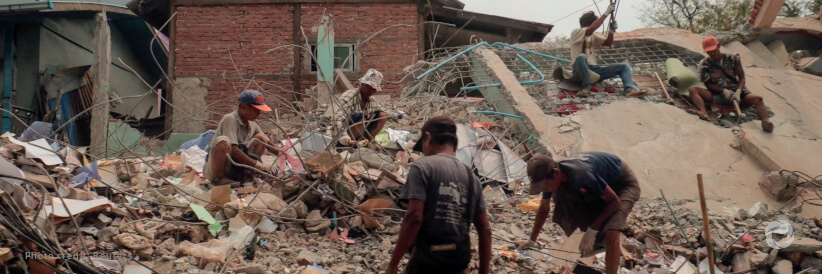With the aid and recovery operation in Myanmar in full swing, IFRC is continuing to bring a steady flow of lifesaving aid into the country, as well as distributing prepositioned supplies that were already in the country that could support up to 5 000 households from day one of the disaster.
Within six hours of the earthquake, IFRC supply chain teams in Myanmar, the Asia Pacific region, and Geneva had mapped available stocks, activated pipelines, and coordinated with partners to start moving cargo—despite damaged roads, broken communications networks, and air landing curfews.
Within the first week of the devastating earthquake that struck the country on 28 March, IFRC and its partners successfully delivered eight charter flights and six cargo shipments of aid into Myanmar — equivalent to 50 fully loaded trucks or a convoy stretching over 1.2 kilometers. Each delivery was part of a tightly synchronized effort across borders, time zones, and agencies, with IFRC working closely with partners, including strong private sector engagement.
11 April, an IFRC relief flight, supported by standing partner Airlink, arrived in Yangon carrying further essential items including hygiene kits, jerry cans, shelter kits, and tarpaulins. This is the eighth flight into the country carrying IFRC relief items and comes as the country continues to face extreme heat – over 40 degrees Celsius– and the imminent arrival of the monsoon and cyclone seasons, as well as ongoing aftershocks.
Humanitarian needs remain high, with many people continuing to be without shelter and clean drinking water. Despite challenges such as the collapse of bridges – including one of the main crossing points across the Irrawady River – damaged roads and destroyed telecommunications networks, IFRC has rapidly mobilized, adapted, and delivered critical aid to the hardest-hit areas.
An additional three flights carrying over 500 cubic meters of essential supplies are now en route in collaboration with our partner DG ECHO. These will be followed by further shipments by sea to ensure continuous delivery of life-saving assistance.
Interviews can be arranged from Kuala Lumpur and Geneva on the latest with aid flights into the country – including from Kuala Lumpur International Airport.

